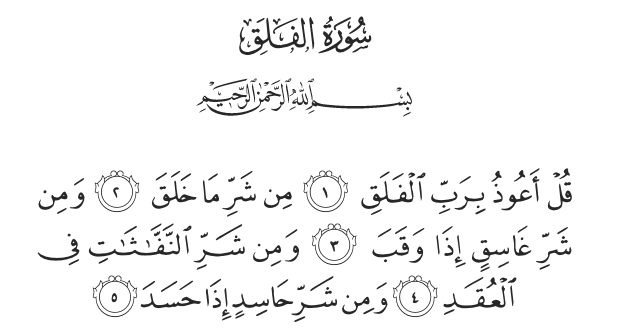The Virtues and Explanation of Surah Al-Falaq
Surah Al-Falaq, also known as “The Daybreak,” is one of the two protective chapters, along with Surah An-Nas, often referred to as the “Mu’awwidhatain.” These two chapters are recited for protection against evil and harm. Surah Al-Falaq focuses on seeking refuge in Allah from various forms of evil, highlighting the significance of turning to Allah alone for protection. The chapter is short, yet it holds profound meaning in safeguarding one’s soul and well-being.
Translation and Interpretation of Surah Al-Falaq in English
Surah Al-Falaq in English begins with the verse:
“Say, I seek refuge with the Lord of daybreak, from the evil of what He has created.”
This verse sets the foundation of seeking Allah’s protection from the general harm that may come from His creation. Ibn Ashur explained that the “Lord of the daybreak” is Allah because He creates the light that breaks through the darkness of the night, making daybreak symbolic of relief after the dangers of the night. The verse emphasizes seeking protection from Allah, not from any other source, recognizing His ultimate power over all creation.
The interpretation continues with a focus on specific evils from which refuge is sought.
“And from the evil of darkness when it settles.”
This verse highlights the dangers that may arise at night, such as wild animals, harmful creatures, and even criminals who may take advantage of the cover of darkness. The night can bring many unseen threats, and this verse calls upon Allah to protect us from these hidden dangers.
“And from the evil of those who blow on knots.”
Here, the verse refers to sorcery, specifically the actions of witches or magicians who cast spells by blowing on knots. The commentators explain that this could refer to those who practice harmful magic. During the time of the Prophet Muhammad (PBUH), it is narrated that the Jewish women of Labid bin al-A’sam cast spells on him, which Allah cured through the recitation of Surah Al-Falaq and Surah An-Nas. The phrase emphasizes the power of protection against harmful intent and sorcery.
“And from the evil of an envier when he envies.”
This final verse addresses the harm that comes from envy. An envious person may wish ill upon others, desiring to see their blessings taken away. This form of evil can manifest through both malicious intent and actions aimed at causing harm. The verse teaches us to seek refuge in Allah from those who harbor jealousy and may act upon it to bring harm to others.
The Significance of Surah Al-Falaq
Surah Al-Falaq has profound significance in Islamic tradition. The Prophet Muhammad (PBUH) frequently recited this chapter along with Surah An-Nas for protection against various harms. There are several hadiths that highlight the importance of these two chapters together, making them essential in the daily lives of Muslims.
- Protection from Evil:
In a hadith narrated by ‘Uqbah bin ‘Amir, the Prophet (PBUH) said:
“Do you not see the verses revealed to me tonight, the like of which has never been seen? They are Surah Al-Falaq and Surah An-Nas.” (Muslim)
This shows the unique status of these two chapters as the ultimate protection. - Recitation during Illness:
It is also reported that the Prophet Muhammad (PBUH) used to recite the Mu’awwidhatain (Surah Al-Falaq and Surah An-Nas) and blow over himself when he was ill. He would recite them and rub his body for healing and protection. - Recitation Before Sleep:
The Prophet (PBUH) also advised reciting Surah Al-Falaq and Surah An-Nas before going to bed. These chapters offer protection from unseen harm during sleep, which is a time when one is most vulnerable. - Curing from Sorcery:
The Prophet (PBUH) was once affected by magic, and it was through the recitation of Surah Al-Falaq and Surah An-Nas that Allah granted him relief and cured him. These chapters serve as powerful reminders that Allah is the ultimate protector against all forms of evil, whether they are physical or spiritual.
Conclusion
In conclusion, Surah Al-Falaq holds significant importance for Muslims. It provides a means of seeking refuge in Allah from various evils, including the darkness of the night, sorcery, and envy. The teachings of the Prophet Muhammad (PBUH) emphasize the frequent recitation of Surah Al-Falaq for protection. By recognizing Allah’s ultimate authority and seeking His refuge, Muslims can find peace and protection from the harms that exist in the world.
Reciting Surah Al-Falaq regularly, especially in times of fear or vulnerability, serves as a reminder of Allah’s power and mercy. It strengthens the believer’s trust in divine protection and encourages turning to Allah for guidance and safety in every aspect of life.


